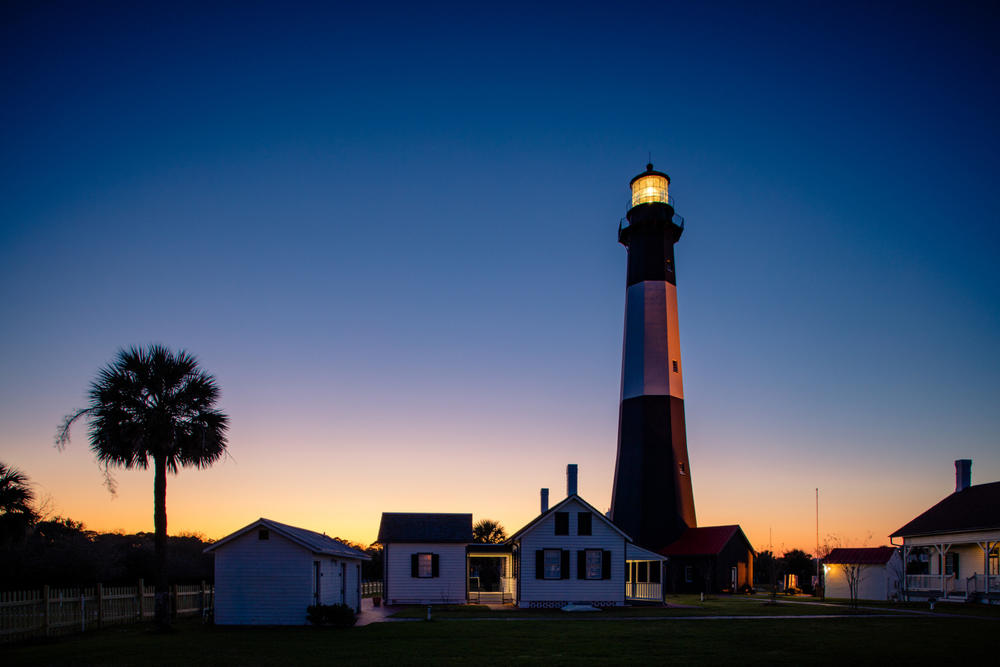
Section Branding
Header Content
Georgia Tourism Industry Bouncing Back From Pandemic Heading Into Summer
Primary Content

When the coronavirus pandemic struck Georgia in March of last year, no industry shut down harder or faster than hospitality.
The leisure and hospitality sector lost 223,000 jobs statewide between February and April 2020.
In Atlanta, hotel occupancy plummeted from 74% in February of last year to just 9% in April.
“We’re a convention city,” said William Pate, president and CEO of the Atlanta Convention & Visitors Bureau. “All of a sudden, the conventions canceled.”
“We lost half of March, all of April and most of May,” added Joe Marinelli, president of Visit Savannah, that city’s tourism promotion agency. “Losing those months was hard on us.”
But as the second Memorial Day of the COVID-19 era approaches, and with it the start of the summer vacation season, the signs point to a tourism recovery.
“We’re picking back up,” said Mark Jaronski, the deputy commissioner at the Georgia Department of Economic Development in charge of the agency’s tourism division. “The vaccine rollout has had the most positive effect on our visitation.”
Even during its worst days, the pandemic didn’t damage Georgia’s tourism industry as much as it hurt other states.
Jaronski credited the comparatively soft impact to Gov. Brian Kemp’s decision not to completely shut down the Georgia’s economy when he issued a shelter in place order in April 2020.
“Because we remained open, we were able to do better than the national average and many states,” he said.
While conventions, concerts and sporting events were shut down, Georgians began venturing out to the North Georgia mountains and the state’s beaches within weeks of Kemp’s order.
“People wanted to stay away from crowds and large group gatherings,” Jaronski said. “They were told by health experts and opinion leaders to stay away from groups, but maybe it’s OK to go to the beaches or mountains.”
There have even been some success stories during the pandemic. As the isolation afforded by camping sent sales of recreational vehicles soaring, visitation to state parks went up.
During fiscal year 2020, which ran through the end of June of last year, visits to state parks grew to 11.8 million, an increase of 562,000 over the previous year. Camping occupancy improved from 13% to 46%.
“Last year was quite a busy year,” said Kim Hatcher, spokeswoman for the Georgia Department of Natural Resources’ Parks, Recreation & Historic Sites Division. “Occupancy is definitely up, mostly for camping.”
With the continuing popularity of the beaches and mountains, the state’s leisure and hospitality industry had gained back 144,000 of the 223,000 jobs lost to the pandemic by March of this year, 65% of the total, according to the Georgia Department of Labor.
Even more convention-dependent cities have begun to bounce back from the pandemic.
Marinelli said weekend visits by leisure travelers began heading back up by mid-June of last year and are going strong heading into the summer.
“Leisure travel is a big winner right now,” he said. “With Savannah being a leisure destination, we’re fortunate.”
Pate said Atlanta is forecasting a similar increase in leisure travel this summer.
To help complete the recovery, the state has launched a new marketing campaign aimed at the pent-up demand for travel on the part of pandemic-weary Americans.
The campaign conjures up the image of a sprinter coiled at the starting line. Instead of “Ready. Set. Go,” the slogan is “Ready. Set. Georgia.”
Jaronski said the new campaign targets the growing number of Americans eager to travel longer distances than last year, either by driving or flying.
“Last year, we focused almost exclusively on in-state travelers,” he said. “Now, we’re expanding beyond Georgia to bordering states and places like New York, Chicago and Miami.”
Along with the yearly update of the Georgia travel guide, the state tourism division has at its disposal $1 million in grant funding earmarked in Kemp’s mid-year budget for tourism marketing.
Jaronski said half of that money will go to tourism promotion agencies across Georgia that depend on hotel-motel tax revenue, a source of funding severely depleted by the pandemic.
Pate said the Atlanta Convention & Visitors Bureau’s revenue is down 65% this year.
“It’s had a significant impact on the revenues of CVBs across the state,” he said.
Jaronski said the other half of the state grant money will go to individual businesses in the hospitality industry that have been hurt by the pandemic, including hotels, restaurants and tourist attractions.
Tourism projections show Georgia’s convention business will be the last to recover.
Pate said Atlanta has a “very strong” convention calendar booked for the last half of this year.
Marinelli said many of the conventions originally slated for Savannah last year or early this year have been postponed until late this year or early in 2022.
“People have to start going back to their home offices before [businesses] start sending them out to travel,” Jaronski said.
Similarly, sporting events are backloaded into this year’s calendar, including two Chick-fil-A Kickoff games over the Labor Day weekend at Atlanta’s Mercedes-Benz Stadium to begin the college football season and the SEC Championship game in December.
Cobb County recently lost Major League Baseball’s All-Star Game due to be played in July at Truist Park as part of a protest over a controversial election overhaul Kemp signed in March. But Pate said no other scheduled events have threatened to pull out.
Pate expects the tourism recovery will build on itself. As more and more people get outside, it will restore confidence that traveling is safe again, he said.
“Now that vaccines are pretty much available, people are out and about,” he said. “They want a vacation. They didn’t get one last year.”
This story comes to GPB through a reporting partnership with Capitol Beat News Service.

